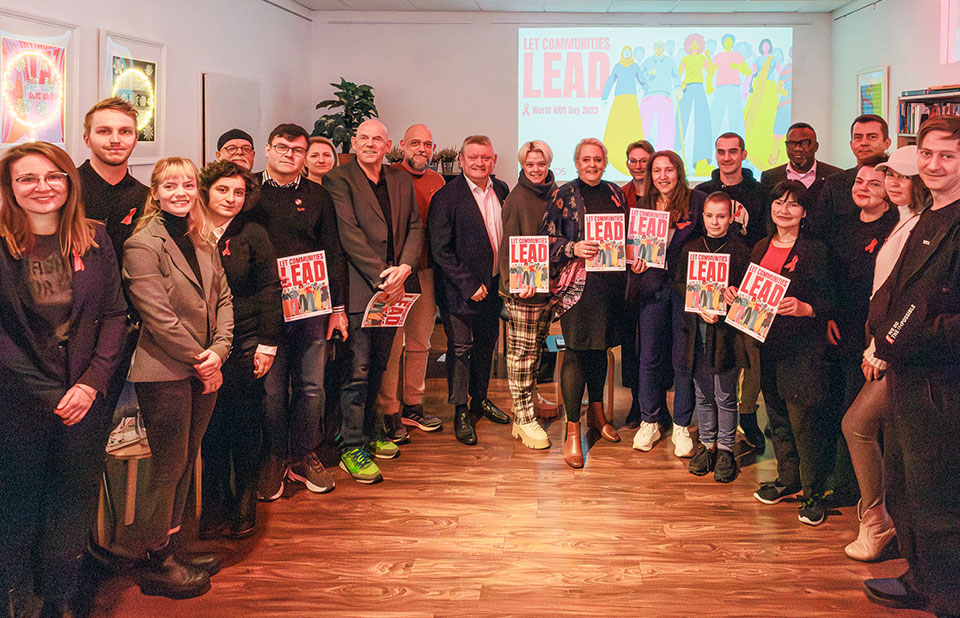Since the beginning of the war in Ukraine, communities of people living with and affected by HIV have been at the forefront of ensuring the continuity of life-saving HIV services, both for those who remained in Ukraine and for those arriving in Germany as refugees.
At a special World AIDS Day event in Berlin co-hosted by UNAIDS and 100% Life Ukraine, community representatives and civil society activists thanked the German government and UNAIDS for their support and spoke about the continued challenges they face.
“Our journey exemplifies how the strength of perceived minorities and real community leadership can drive life-saving programmes and innovations that can impact the lives of millions of people,” said Valeriia Rachinska, Director of Human Rights, Gender and Communities at 100% LIFE Ukraine. “None of this would be possible without the support of international partners and donors. Global solidarity and support from our partners are the chance for a fair and thriving tomorrow for all, especially those living with HIV.”
100% LIFE is the largest patient-led organization in Ukraine which has as its mission to fight for life. The Network works with patients and for patients, including the representation of the interests of people living with HIV in 25 regions of Ukraine.
Since the beginning of the war in Ukraine, Germany has donated €1,050,000 in emergency funding to UNAIDS, empowering the provision of critical support to people living with and affected by HIV in Ukraine, Poland and Moldova. This includes providing temporary accommodation, humanitarian assistance, social protection, primary health care and testing for HIV, hepatitis C, STIs and tuberculosis. The emergency fund also covered the enrollment of people in HIV prevention and treatment programmes, offering comprehensive care and support.
Among the speakers at the World AIDS Day event was Silke Klumb, CEO of the German AIDS Federation, who underlined the importance of the partnership between government and civil society in ensuring continued access to HIV prevention, treatment and care services for people affected by the war in Ukraine.
"Community-led responses have been and continue to be critical in the HIV response, both in Germany and globally. Thanks to public funding Deutsche Aidshilfe has been able to engage in community-led prevention, counselling, testing, care, and support for 40 years now. Upon this foundation and through the broad network in Ukraine, Eastern Europe and Central Asia, Germany’s community-led organizations under the umbrella of Deutsche Aidshilfe were able to act immediately to Russia’s full-scale invasion of Ukraine,” said Ms Klumb. ”Over the last 18 months, we provided support, information, translations to people fleeing the war and linked them to care. Platforms such as self-help conferences and other meetings helped to strengthen the communities of people living with and affected by HIV. Deutsche Aidshilfe is committed to continue putting the communities at the centre of our work.”
During the event, UNAIDS Deputy Executive Director of Policy, Advocacy and Knowledge, Christine Stegling, presented the new UNAIDS World AIDS Day report Let Communities Lead. The report shows how communities have been the driving force for progress in the global fight against HIV. It shows that investing in community-led HIV programmes can have transformational benefits.
“Since the earliest days of the AIDS pandemic, community leadership has driven life-saving access to HIV treatment and prevention. Continued progress against HIV/AIDS in Ukraine - despite the war and its resulting refugee crisis - is the direct result of Ukrainian and German community leadership. A community-led response is well-positioned to maintain continuity of HIV prevention and treatment services, especially in times of crisis,” said Ms Stegling. “Continuity of HIV care is essential for achieving our ultimate goal of ending AIDS as a public health threat by 2030. UNAIDS thanks all community leaders who stepped up in these challenging times and we thank nations like Germany who understand the value of investing in a community-led response to HIV/AIDS - especially in times of war and other crises.”
The event was moderated by Peter Wiessner of Action against AIDS Germany.
